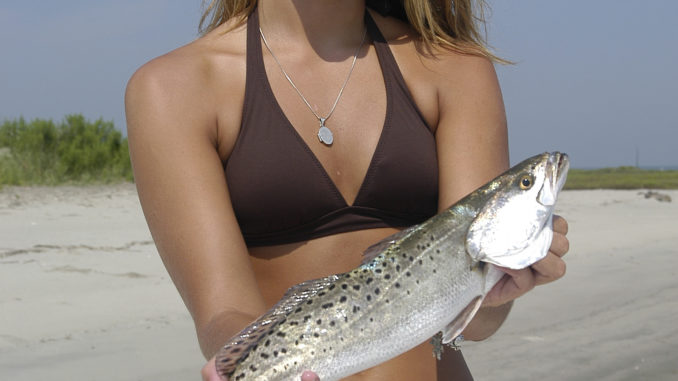
The coastal saltwater gamefish status bill, HB 353, didn’t pass the June 9 crossover date to be considered in the second portion of the 2011 session of the North Carolina General Assembly.
However, the result of intense opposition by North Carolina’s commercial fishing industry to the bill may affect legislative saltwater fisheries decisions in the future.
The bill would have given gamefish status to spotted seatrout, red drum and striped bass in North Carolina coastal waters, prohibiting them from being sold or bartered for profit, and allowing them to be taken only by hook-and-line.
The position of North Carolina Sportsman on this legislation is laid out in this editorial.
Although the bill had veto-proof majority support in the North Carolina House and Senate, it fell victim to a backroom deal.
Sources told North Carolina Sportsman that House Republicans likely secured votes from more than one Democrat from a coastal district for their budget, creating a veto-proof majority, in exchange for dropping HB 353 this session.
Gov. Beverly Perdue, a Democrat, vetoed the Republican budget bill on June 12, but the House overrode her veto at midnight yesterday (June 14), with five Democrats crossing the aisle to vote for the budget.
The Senate is expected to quickly override her veto as well.
The main sponsor of HB 353, Rep. Darrell McCormick (R-Yadkinville), said, “I was not part of any budget deal” and that he wasn’t aware of any deal involving the gamefish bill.
Handling the bill as chairman of the Subcommittee on Business and Labor for the House Committee on Commerce and Job Development, McCormick said he decided the management of the state’s saltwater resources needed further study. He even sounded upbeat after HB 353 failed to survive the crossover date.
“I’m really excited about where we ended,” McCormick said. “We’re going forward with this, but we want it to be a deliberative process. We will have a study committee (in the May 2012 short legislative session) that will include all interested parties.
“We’ll talk to organized recreational fishing groups, regular recreational anglers, businesses that are directly affected like tackle shops, outdoor suppliers, outfitters, the guide industry, travel and tourism people such as hotel and motel owners, and commercial fishermen and their representatives.”
McCormick said “everything” regarding fisheries management in North Carolina would be on the table.
“We’ll be able to do a lot more in this study than just address three target species,” he said. “We want to look at the big picture. We have a lot more (economic) opportunity than we realize. We don’t have any goals or limits.
“We just want to make sure we’re doing the best we can for North Carolina’s citizens and allocation of its resources.”
McCormick said intense and extreme opposition to HB 353 from the commercial fishing industry over three species that make up such a small part of its annual catch surprised him and made him look more closely at the issue.
“I was surprised at what I found,” he said. “It appears, if properly managed, we could be talking about an $8 (billion) to $10 billion industry.
“It’s only a fraction of that now.”
McCormick said the study would rely on current federal economic studies of states along the Atlantic coast, including North Carolina, that show how much economic energy could be generated by saltwater fishing.
“From what I’ve seen so far … North Carolina is about 20 years behind the economic curve,” he said. “There’s two ways to raise revenue: one is to tax people – and we don’t think that’s a good idea – and the other is to create economic activity.
“Getting more people involved in saltwater fishing, especially non-residents, easily could raise hundreds of millions of dollars.”
McCormick also said he had no problem with the North Carolina Division of Marine Fisheries and its director Louis Daniel, who opposed the gamefish bill.
“Louis told me it’s his agency’s job to manage fisheries with science, and it has certain directives it has to follow,” McCormick said. “He’s said (HB 353) is an allocation of resources bill, not a scientific bill.”
Dick Hamilton, director of the North Carolina Camouflage Coalition, said he was disappointed HB 353 was a victim of political battles in Raleigh but “would go along with it because we don’t have an alternative.”
“But it’s a long time until May, and this (outcome) has left thousands of fishermen hanging on the edges of their seats, sending e-mails to the legislature every day. Meanwhile the legislature was in a box,” Hamilton said. “It’s a very strange situation.”
Reasons to grant gamefish status to these species are outlined in this article.




Be the first to comment